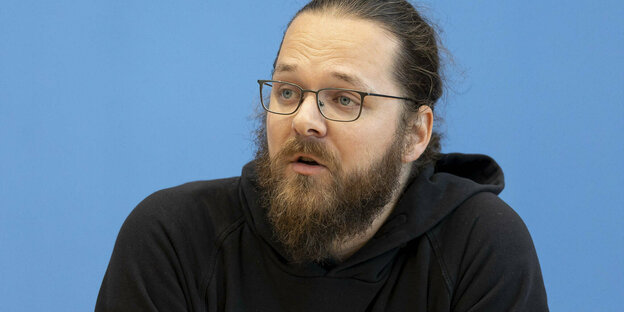The Berlin prosecutor's office is investigating the head of FragDenStaat, Arne Semsrott. He leaked court documents about Última Generación.

If convicted, Arne Semsrott faces a fine and, in the worst case, even prison. Photo: Kira Hofmann/imago
taz: Mr. Semsrott, the Berlin public prosecutor's office recently brought charges against you because you published three documents from an ongoing case. Is your freedom of information portal FragDenStaat a criminal organization?
Arne Semsrott: No, so far we have been able to free ourselves from this accusation, but hey, who knows what the political situation will bring.
However, as editor-in-chief, you knowingly committed an alleged crime by publishing documents from an ongoing court case against Last Generation. The question is why climate activists are classified as a criminal organization. Why are you doing that?
We want to clarify that article 353d No. 3 is unconstitutional. In fact, the information on this case has almost ironically shown what it is about: in Germany it is prohibited to report verbatim from official documents about ongoing criminal proceedings. Nor in my case can the media publish the accusation against me or quote it word for word. But inaccuracy is, of course, problematic, especially in legal cases. It is part of the freedom of the press to be able to obtain information about important criminal proceedings through original documents and word-for-word reproductions.
Born in 1988, she is a journalist and activist. She heads the FragDenStaat project, which fights for freedom of information and freedom of the press. She campaigned for transparency at Schufa, sits on the board of Lobbycontrol and founded the Freedom Fund Initiative.
What is the content of the leaked documents and why do you think it was necessary to publish them?
The Last Generation is being investigated for a very serious charge: the formation of a criminal organization. This has far-reaching consequences and opens up the possibility of telecommunication surveillance measures against many of those affected. Of course, there needs to be a public debate about this. But this is only possible with access to the original documents. Thus, on the one hand we have a somewhat obscure paragraph that does not exist in other countries like Austria, and on the other hand we have the great value of freedom of the press. We await a ruling that recognizes the unconstitutionality of this rule.
The paragraph is intended to protect those affected from prejudice and exposure and to ensure the impartiality of judges and lay witnesses. What's wrong with it in your opinion?
It is completely understandable for individual case constellations. But in the present trial, the defendants of the Last Generation have no problem maintaining a public debate, quite the opposite. And the case is already being discussed publicly anyway, so I don't see any impact on lay judges. This shows that the norm does not take into account freedom of the press. We have to admit to the press that in individual cases such information belongs to the public. It is a question of balance: not all information should be discarded in all procedures, but there are many constellations in which a weighting should result in public information being more important.
Former FDP Justice Minister Sabine Leutheusser-Schnarrenberger called for this paragraph already in 2007. § 353d No. 3 StGB and the Greens have already requested it without success. The current FDP Justice Minister Buschmann has now announced that the BGH will be rationalized. Why hasn't this happened yet?
We have ongoing cases and a reform of the Penal Code underway, but unfortunately we must observe that the Ministry of Justice, here and elsewhere, does not react as decisively as it could. If the ministry does not take care of it, the Bundestag will have to regulate it.
What change do you ask for?
In my opinion, the paragraph should be deleted without replacing it. There are other voices that would introduce a balance clause. This is a technical discussion that does not need to be decided now. What we need now is the decision to change. We have to recognize that the current agreement is not working and reform it.
What happens if you fail in all cases?
We believe that the previous jurisprudence of recent years supports us and our publication was justified. However, if the German courts took a different view, we would choose Strasbourg as the last resort. The European Court of Human Rights has also warned in the past about the importance of press freedom in judicial proceedings.
Why is this so important to you?
We must be attentive to how freedom of expression is treated. And where there are interventions, we have to protest loudly. When looking at political developments, we must also consider how authoritarian governments might use certain regulations. This particular passage is ideal for taking action against journalists. The AfD is interested in government involvement and has a very big problem with press freedom. He will take advantage of every opportunity to act against the free press. That is why it is also important to fight now for greater freedom of the press.
The Prosecutor's Office explained in detail in the indictment that, from its point of view, even taking into account other legal interests, this was clearly a criminal offense and it saw no constitutional doubts. You face a year in prison or a fine. Are you already regretting it?
I am also confessed. If a conviction occurs, I expect a fine. If necessary, I also manage another project, it's called the Freedom Fund, where we buy poor people alternative prison sentences by paying their fines for driving without a fine. I hope I don't have to deal with myself in any other capacity.